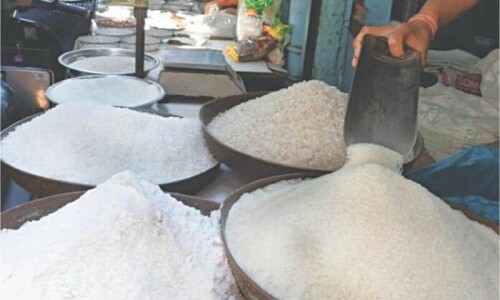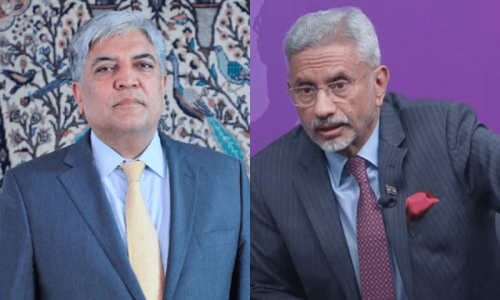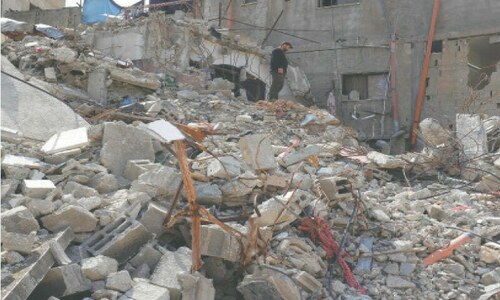 INDIA’S perilous hydrocarbons production scenario is likely to improve from next year after Reliance Industries Ltd, the country’s largest private sector firm, begins producing oil and gas from the Krishna-Godavari (KG) basin in Andhra Pradesh.
INDIA’S perilous hydrocarbons production scenario is likely to improve from next year after Reliance Industries Ltd, the country’s largest private sector firm, begins producing oil and gas from the Krishna-Godavari (KG) basin in Andhra Pradesh.
Mukesh Ambani, chairman, RIL, last week announced that his firm will account for over 40 per cent of the country’s oil and gas production in about 18 months. Reliance was among the first companies to be awarded a contract, after the Indian government unveiled its new exploration and licensing policy (NELP), way back in 1999.
Nearly 50 blocks, including 10 onshore, 26 offshore and 12 deepwater offshore, were put on auction in the first round of the NELP. The KG basin in Andhra Pradesh has proved to be the most lucrative and RIL hit pay dirt with its block, the KG-D6 block. RIL has a 90 per cent stake in the block, while Niko Resources, a Canadian firm, has the remaining 10 per cent.
“This is a major milestone in the march towards India’s fuel security,” says Ambani, who earlier this year was named the world’s fifth richest individual with assets of $43 billion, by Forbes magazine. “This oil production will not only benefit customers but also reduce subsidies and thus release huge financial resources for the government, which can spend it on development.”
According to Ambani, hydrocarbons from the KG basin will save $20 billion in foreign exchange every year. Production begins in January, with 90 cubic metres of saleable gas a day. Total production is expected to rise to 550,000 barrels oil equivalent a day (BOED) over the following 18 months, adding up to 40 per cent of India’s production. Currently, India imports 70 per cent of its energy requirements.
The company expects to start pumping 15 million metric standard cubic metres (mmscmd) of gas by next year, going up to 90 mmscmd two years later. In about five years, the company hopes to pump 115 mmscmd of gas from the KG basin.
“With this, RIL will be among the top-20 integrated energy companies in the world,” claims Ambani. “We have also joined the elite club of deep-water operators in the world.” It will be among the world’s largest deep-water oil well developers. The company – which has interests spanning textiles, energy, refineries, retail, life sciences and infrastructure – plans to invest $5.2 billion over the coming years in developing the KG basin.
The Indian energy major, which already operates a 660,000 barrels per day (bpd) refinery at Jamnagar in Gujarat, is almost doubling the capacity there. The new, 580,000 bpd refinery is fast coming up next to the existing one in a special economic zone. Once it goes on stream, it will emerge as the world’s largest refining complex.
* * * * *
BUT the growing hunger for energy in India is forcing its energy majors – such as RIL and state-owned Oil and Natural Gas Corporation (ONGC) – to look for assets abroad. Reliance is on the look out for oilfields in the Middle East, Latin America and the Far East.
The company has about a dozen assets in seven countries, though it still does not own an oilfield. RIL’s ultimate aim is to produce about 400,000 bpd of oil, with the bulk (300,000 bpd) being sourced abroad.
State-owned ONGC is also concentrating on Latin America, Africa and the former Soviet republics. Last month it paid $2.5 billion to acquire Imperial Energy Plc of Britain, which operates in Russia. It already has oil and gas exploration and production operations in India, Russia, Vietnam and Sudan.
Like RIL, ONGC is also investing $5.3 billion in developing gas finds in two of its offshore blocks in the KG basin. According to D.K. Pande, director, exploration, ONGC, the block is right next to Reliance’s D6 block. The company aims to produce 25 mmscmd of gas by 2013 and about 8,000 bpd of oil.
Unlike RIL, ONGC has diluted its equity in the project; it has three international partners – Norway’s Statoil and Carin of the UK (with 10 per cent each) and Brazil’s Petrobras, which has a 15 per cent stake in the block.
R.S. Sharma, chairman, ONGC, says the company has “a huge appetite for growth. We are looking for quality acquisitions. We are not going here, there and everywhere. We are going in a concentrated way.”
But the going has not been smooth for ONGC, India’s largest company, in its overseas forays. Recently, for instance, it has been engaged in a battle with China’s Sinopec over the acquisition of Tanganyika Oil, a Canadian firm which has oil and gas assets in Syria. Sinopec has been outbidding ONGC in a bid to acquire the company.
The public sector exploration and production company is also seeking higher price from the government for its gas. Oil and gas prices are still under the administered pricing mechanism (APM) and ONGC is paid just $2.11 per million British thermal unit (mmBtu) of gas. ONGC wants this to be raised to $4 per mmBtu, but the government refuses to do so.
Sharma, the ONGC chairman, says the company loses a whopping Rs9 billion a year on its gas business because of the APM. Just to break even, it needs a price of $3 per mmBtu, and to ensure continued investments in new fields, another dollar will have to be added.
* * * * *
THINGS of course are not hunky dory for Reliance, for that matter. Though it has had a promising start with its KG basin discoveries – and even a gas pipeline linking the eastern and western coasts is ready – the company cannot sell its gas as there is a court order restraining it from doing so.
The Bombay High Court had issued an injunction against the sale of gas from RIL’s KG field after Anil Ambani, Mukesh’s estranged younger brother, sought its intervention in a dispute. Anil’s Reliance Natural Resources Ltd (RNRL) has staked claim on 28 mmscmd of gas from the field, pointing out that it was part of an agreement signed by the two warring brothers when they split their family empire a few years ago.
Government-owned electricity major National Thermal Power Corporation (NTPC) – which was to get 12 mmscmd of gas from the KG block at a price of $2.34 per mmBtu, is also a partner to the dispute.
Last year, an empowered group of ministers had approved a new pricing formula, valid for five years, for NELP players. It had fixed a price of $4.2 per mmBtu – more than what ONGC is demanding from the government – for gas to be sold by NELP licensees. RIL now wants to sell its gas at a much higher price.
The Bombay High Court had stayed the sale of gas from the KG basin to parties other than RNRL and NTPC. But the Indian government now wants the stay to be lifted, as production of gas is expected soon from the RIL field in the KG basin. Petroleum secretary R.S. Pandey confirms that the government has requested the court to lift the injunction on gas sales.
But Anil Ambani, who is close to Samajwadi Party (SP) leader Amar Singh – now in the good books of the United Progressive Alliance government – has accused the government of siding with a private company in a dispute.
The marathon-running younger Ambani sibling – who was ranked as the sixth richest individual (with assets of $42 billion) by Forbes earlier in the year – has also sought damages worth Rs100 billion from his elder brother in a defamation suit filed in the Bombay High Court last week. According to Anil, elder brother Mukesh had defamed him in an interview given to the New York Times.
The ongoing battle between the two Ambani brothers is likely to turn uglier over the coming days as both of them expand their operations, inevitably stepping on each others toes.














































